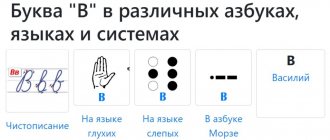Disyllabic words are words in which two vowel sounds form two syllables
The number of phonetic syllables in a word depends on how many vowel sounds it contains. The vowel sound is syllabic. It can form an independent syllable or one or more consonants are grouped around it and form a syllable.
Examples-dress, i-gra, o-braz, u-chet, ba-nan, ve-ter, glo-bus, gli-na, clo-un
The above words contain two vowel sounds; accordingly, they form two phonetic syllables. We will call such words two-syllable.
Two-syllable words contain
Definition of monosyllabic words
Units of speech that consist of one phonetic syllable and, accordingly, have only one syllabic vowel sound on which the stress falls, can be called monosyllabic. They may consist of:
- from only one letter: for example, the personal pronoun “I”;
- of two letters - a vowel and a consonant, which is divided into open syllables: the pronouns “we”, “you”, “you”; pa (dance term), and closed syllables: hell, hedgehog, already, mind, il, mustache, yak;
- of three or more letters, one of which must be a vowel. They have open (haze, darkness, evil) and closed syllables (roar, run, cube, drill, view, tea, varnish, juice, cat, king, circus, ale, night, scarf, text, class, power, waltz, put , bunch, cane).
It should be remembered that an open syllable ends with or consists of a syllabic sound (usually a vowel), and a closed syllable ends with a consonant sound.
Meaning
What does a one-syllable word mean? The complexity of a word is independent of the grammatical, morphological features of words, as well as their lexical meaning
Among the monosyllable words you can find:
- Nouns in the nominative and indirect cases (cheese - nominative case; strength - plural, gender case, darkness - darkness, darkness, etc.).
- Full and short forms of adjectives (angry - angry, rude, white, bald, dashing, etc.).
- Verbs (soaped, chalked, sang, howled, stood up, was, hide, etc.).
- Adverbs (in a big way, to the fullest, in the old days, far away, evil, sorry, in vain, etc.).
- Various pronouns (you, you, he, we, I - me; all, myself; what, how, than; two, three, no, this).
- Particles (at least, well, tea (colloquial), let, after all), as well as the interjections and prepositions already mentioned above.
Polysyllabic options
If a word consists of two syllables, then it is disyllabic. In this case, it will invariably contain two vowel sounds, and it can be single and independent or surrounded by consonants: ya-kor, i-dol, seven-ya, u-dav, o-zon, o-buv, seven-ya .
Two-syllable words can consist of:
- of two open syllables: willow, kara, plum, river, school, crown, cinema, bed, theme, spinning top, mice;
- of two closed syllables: question, bamboo, quarter, column, size, watermelon, fire, balcony;
- from one open and one closed syllable: agent, announcement, list, city, fence, edit, do, board, wave, sled, sambo.
Each word can be mentally divided by a vertical line to see open and closed syllables in its composition: a-gent, e-not, spi-sok, vol-na.
The name of the term “three-syllable words” also speaks for itself: they contain three syllables (open or closed) and three vowel sounds. As in the case of disyllabic ones, a vowel sound can be either single or surrounded by several consonant sounds: o-go-rod, o-val-ny, u-slit-e, u-chi-tel, nek-ro-log .
When pronouncing, three impulses of exhaled air are made, but one of them is stronger due to the stressed vowel sound, and the other two are weaker in unstressed syllables. To correctly place emphasis on such words, it is recommended to use dictionaries that indicate their pronunciation.
Examples of three-syllable words: analysis, base, road, crow, dog, crown, candy, prefix, telephone, cheerful, run away, answer, mean, emphasize, buck.
Dividing words into syllables
The website slogi.su is the most convenient and fastest service for dividing any Russian words into syllables.
The service can highlight syllables both in individual words and in text. We do not have a ready-made dictionary of words with pre-selected syllables; we determine syllables in words automatically. This means that you can enter a Russian word in any number, gender, case and any other form of declension of the word. In addition to the analysis, we provide information on each highlighted syllable in the word - the type of syllable, the division rule.
The division into syllables on the site is carried out taking into account the modern rules of the Russian language school curriculum (traditional school) and programs with in-depth study. If there is a difference in the syllable division of the two programs, explanations are given on the word page.
If you need to break all the words in the text into syllables, use the form below. Using the form, it is convenient to bring the text of a song into karaoke format, prepare a children's story for reading syllable by syllable, break words into syllables for foreigners and for other useful needs.
Quadrisyllabic and other polysyllabic
Four-syllable words are defined using a similar principle: they contain four syllables and, accordingly, four vowel sounds, which, again, can be either independent single sounds or surrounded by several consonant sounds. During speech, four bursts of exhaled air are made. One of the syllables is necessarily stressed, while the rest remain unstressed and weaker.
Examples: kaleidoscope, ovation, collection, operator, fruitful, handsome, stool, semantics, rhetoric, catamaran, friendly, excellent student.
Depending on the number of syllables and vowels, words in Russian can be:
- five-syllable: sentence, exercise, decoration, statement, mathematics, mechanical, genetic, disgusting, understanding, highlighting, awareness, revolution;
- six-syllables: liberation, dominance, winner, poem, acquisition, cyclists, radio technology, belted, fifteen-year-old, uncertainty, social studies, resuscitation;
- semi-syllabic: multinational, programming, attraction, accession, mineralization, autobiography, bifidobacteria, waterfowl, like-minded people, uniformity, shipwreck, mechanical engineering;
- eight-syllable: automated, autobiographical, administration, favored, video surveillance, respected, hydroelectric power station, interested, fascinating, industrialization, energy-saving, choreographic.
- nine-syllables: automotive, recording, collecting, flammable, materials science, forestry, disarming, general education, self-improvement, word-building, characterizing, rehabilitation.
However, such long units of speech are not found so often in texts. In them, you need to count the number of vowels or mentally divide them with a vertical line into separate syllables in order to determine which group they belong to: u-prazh-ne-ni-e, sti-ho-tvo-re-ni-e, do - hundred-note-ness.
Examples of four-syllable words
Four-syllable nouns can only consist of open syllables:
- azalea;
- stop;
- queen;
- lizard;
- arabesque;
- piano;
- rhetoric;
- comedy;
- throwing;
- apathy.
Four-syllable nouns with one or more closed syllables:
- operator;
- kaleidoscope;
- catamaran;
- semantics;
- stool.
What other parts of speech can be four syllables:
- proper names (Alexandra, Vasilisa, Margarita, Veronica, Carolina);
- adjectives (fruitful, friendly, gardening, racing, duck);
- verbs (fly, draw, write, move, pick out).
Attention! Conjugating verbs, inflecting nouns, changing adjectives by number and gender can lead to a change in the number of syllables compared to the initial form.
Difficulty of definition
In the singular, a word can have one syllable, and in the plural, several. For example, house is a one-syllable word, but the word “house” is not one-syllable. In this case, only the singular word is monosyllabic.
The plural and case forms of the same word may not be monosyllabic.
It is not difficult to determine how many syllables there are in a word with three letters. Such words consist of closed syllables: cat, onion, beetle.
If a word consists of four or more letters but has one syllable, this sometimes causes difficulties. Words with a closed syllable often confuse words with open syllables. Let's compare: bishop and queen. The number of letters in words is the same, but the number of syllables is different.
The number of syllables depends on the number of vowels in the word.
The same monosyllabic words as the words house, steam, are words with a consonant cluster at the beginning of the word (pancake, elephant) and words with a consonant cluster at the end of the word (scarf, tank).
The number of letters does not depend in any way on the number of syllables in a word.
Three syllable words
A word can have more vowels than two. Three vowel sounds combined with consonants form three-syllable words. When pronouncing a three-syllable word, three impulses of air occur, but one of them is stronger, which is created by the stressed vowel, and two are weaker in unstressed syllables. Let's make sure of this by saying the words:
le-tchi-tsa, ko-ro-va, be-li-know.
Examples of three-syllable words
In three-syllable words, consonants are grouped with vowels with two, three or even four sounds per syllable, for example:
- do-ro-ga, bo-ro-da, so-ro-ka;
- pri-sta-vka, kra-so-ta, te-le-fon, ka-ran-dash, bu-ma-zhka;
- jump up, shake up, jump up, wait, look.
A vowel can form an independent syllable in a three-syllable word:
- a-ktri-sa, a-zbu-ka, a-na-us, a-ra-his;
- o-city, o-val-ny, o-fresh-to-live, o-tli-chnik;
- u-gol-nik, u-ra-gan, u-chi-tel, u-slit.
Please note that the orthographic transfer of the words given above does not coincide with their syllable division due to the presence of a single vowel in their sound composition.
Let's learn the rule of word hyphenation in Russian.
Let's compare phonetic syllable division and orthographic hyphenation of words:
- u-gorge-e - gorge; a-zbu-ka - az-bu-ka;
- o-go-rod - o-go-rod; u-ra-gan - hurray-gan;
- o-tli-chnik - from-person-nick; a-dre-sat - ad-re-sat.
What have we learned?
Monosyllabic words, which are called so because of the number of syllables in the word, are words consisting of one syllable. These are words consisting of two letters (hedgehog, south, already), and words consisting of three letters (house, oak, step), and words consisting of four letters (leaf, table, copper), and words consisting of five or more letters (beast, cane, rain). The number of letters in a word is not related to the number of syllables. The main condition for monosyllabic words is that they must consist of only one syllable. Therefore, it is important to be able to divide words into syllables.
Transfer rules
According to the spelling rule, all monosyllabic words are intolerable. They are written on the entire line and are never separated, no matter how many letters they contain: silt, cat, current, boron, scream, squeak, nail, sob, power, etc.
Polysyllabic words, in contrast, are divided according to phonetic syllable division and, when written, can be transferred from one line to another. For example, this is how two-syllable words that contain open and closed syllables are translated: ru-ka, ko-sa, book-ga, may-ka, castle, ball-con, lar-chik, school-ny, book.
However, it should be noted that some two-syllable words have a cluster of consonants in the middle. They can be transferred both according to the phonetic syllable division, and by breaking up this combination of consonants, for example:
- friendship - friendship, friendship;
- heart - heart, heart;
- violin - squeak, squeak.
Sometimes one of the syllables of a two-syllable word consists of a single syllabic vowel: I-measles, i-va, o-sen, i-ris, o-zon, o-buv, u-pal, u-dav. In these cases, a single vowel cannot be separated and left on the line. The word is written in its entirety and is not transferred.
According to the same rule, when writing, three-syllable, four-syllable words, etc. are transferred. They are divided according to the phonetic syllable division: bo-ro-da, do-ro-ga, kra-so-ta, te-le-fon, vzglya-dy- wow, ta-bu-ret-ka, ka-ta-ma-ran, ma-te-ma-ti-ka, che-lo-ve-honest. But if the vowel forms an independent syllable, orthographic transfer does not coincide with phonetic syllable division:
| Phonetic syllable division | Correct spelling |
| u-gap-e | gorge |
| teacher | teacher |
| garden | garden |
| destination | destination |
| stop | stop |
| ovation | ovation |
| u-chi-li-sche | teacher |
Thus, when transferring polysyllabic words, it is important to carefully ensure that single syllabic vowels do not remain on the line separated from the rest of the word: this is contrary to the rules of spelling of the Russian language.
Two-syllable words
According to the number of syllables, words can be polysyllabic: two-, three-, four-syllable, etc.
Two-syllable words, as can be determined by their name, contain two vowel sounds, for example:
sli-va, chair-chick, fence, city, crown, te-ma, u-kaz, island, a-gent, i-gla, snake-ya, evening.
When pronouncing them, the chin will fall onto the palm twice, as there will be two shocks of exhaled air.
We will learn about how to divide words into phonetic syllables and what needs to be taken into account with examples in the article about two-syllable words.
Not all two-syllable words can be transferred from one line to another in accordance with phonetic syllable division. A number of words in which a single vowel forms an independent syllable cannot be transferred, leaving one letter on the line, for example:
- snake-me - snake
- u-dar - blow
- o-braz - image
- i-gla - needle
- a-nis - anise.
Four-syllable words made from open syllables
Piano, cobweb, comedy, mechanics, methodology, nutrition, breathing, mooing, persecution, fortune telling, bathing, swinging, rolling, flow, torment, genetics, waving, throwing, name day, management, hygiene, sidewall, apathy, vitamins, hippos, chemicals, bouquets, waterfalls, chieftains, parrots, captains, committees, suitcases, oceans, students, Japan, oak, fighting, duck, united, running, powerful, odorous, ready, dressed, inflated, rich, watery, guilty, running away, think, offend, have, happen, cuckoo, cackle, soar, tire, surprise, win, take away, roll, scare, read, dig, guess, hiccup, blink, sniff, spend the night, roam, throw, bathe, audio.
Sh
Extinguishing, extinguishing, wearing, staggering, pacing, cuckoo, cheap.
AND
Pressing, buzzing, blackberry, prove, spread, punish, indicate, live, hedgehog.
WITH
Touch, allowance, turmoil, water carriers, honey plants, scooters, pineapples, cell phone, tall, biting, nosed.
WITH'
Ossetians, carrying, goose, hanging, carry, carry away, bite.
Z
Class, knitting, task, mosaic, lucky, pot-bellied, gored, come in, start, replace, notice, boil, crush.
Z'
Luck, winter crops, shops.
L
Melody, blanket, blueberries, half, vacation, threw out, bells, speech therapists, booths, experienced, blue, not enough, knocked out, threw, turned, received, pressed, caught, fished out, pounded.
L'
Division, availability, treatment, size, grocery, surname, fawns, readers, teachers, telephones, giants, hooligans, icebreakers, beloved, great, lazy, prickly, purple, ice, flew, convinced, won, sculpted, taught, singled out, seen, taken out, thrown out, soaped, watered, Italy.
R
Ceramics, shell, pyramid, wound, pioneers, crows, caravans, steamships, drums, hurricanes, fly agarics, vegetable gardens, tomatoes, monitors, workers, mead makers, brewers, veterans, ruddy, world, expensive, steam, fatal, Pinocchio, Romania.
R'
Combustion, drilling, battery, turtle, matter, bird cherry, accident, corridors, dimensions, abstracts, rarities, chicken, holey, crow, America, Bavaria, believe it, say it, thin out.
C
Lentil, student, button, unit, medicine.
* * *
| Bal e You _ and | kukuR at I'll lie down ata |
| veR value | mol one |
| waterl a | writeWith a |
| YouR u go l killer | neR epe piga l and |
| thR about | piw at |
| guWith value | Byl ovitsa |
| and Eating | ByWith o |
| and e h abiva h aboda | R e R o R ukavits |
| h ave | R left |
| h Akiva h Akipe | R u R any |
| h Ahote | With mind |
| h o | With y |
| coR o | Isch e |










